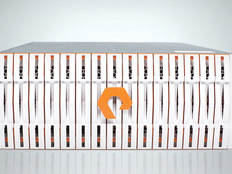What Should IT Shops Look for in a Hosted Services Provider?
The pendulum swings back and forth. What once was a world of centralized technology ruled by mainframes became distributed and personal computing. Now we’re swinging back to the centralized model as file and application servers move offsite to data centers. Organizations can benefit from this move by saving money and a lot of technical frustration if they find the right hosted services provider.
Many organizations never tried to host their own web servers, relying on third-party providers from day one. Whether they share part of a server for low-volume websites, lease a full server, or have service providers house and manage servers (co-location), putting website hardware in a data center makes sense. While providers’ offerings can include power redundancy, multiple Internet connections and even security patches and management, those same advantages now make sense for hosting file and application servers outside your building.
Call it cloud, hosted service, co-location, or software-as-a-service (SaaS); it all means the applications that drive an organization run on hardware in someone else’s data center. According to a recent survey by J.D. Power and Associates, 18 percent of organizations are doing this today, and 38 percent of those list lower price as the primary benefit. Throw in hosted voice-over-IP (VoIP) providers, and include such cloud-based services as offsite backup or hosted exchange e-mail, and the numbers are likely much higher.
What to Consider
If you want to become one of the many organizations leveraging the advantages of hosted services, first consider what should be outsourced and what should factor into choosing a provider. They all tell you they meet data center security requirements, so choose the provider who answers your questions best.
Let’s talk bandwidth first. A hosted services provider will offer multiple Internet connections to multiple providers. Many data center locations are placed on data network connecting points for just this reason. You don't have to worry about the hosting provider's bandwidth (how much they have will surprise you), but you do have to worry about your bandwidth, and providers can help.
Get a dual WAN router and a second Internet service provider immediately. While you’re at it, boost the speed of your primary connection as well. A technology adviser can help you decide how to add redundant bandwidth and to use both pipes for improved performance. Find out how much bandwidth is needed in a perfect world, and see how much you can afford to spend and still get the job done. Fight for the first, and accept the second only if necessary.
Then, consider which apps are good choices to outsource. The simple answer: almost every app available today. You could outsource everything and run virtual computer instances, using some form of virtual desktop interface (VDI) technology. For faster response times, there may be a piece of local hardware to front-end the remote services.
It’s true that local is good, but remote is increasingly becoming the place for hardware, software and management. And help may be as close as the reseller offering offsite backup services.








